- Home
- Sean Platt
Namaste Page 9
Namaste Read online
Page 9
Footsteps approached. Amit stayed low. He saw them come, feet first. He’d chosen a relatively low spot to meet Alfero, so they wouldn’t see under the Escalade’s carriage without squatting. He saw boots, then more boots. He looked around as they approached, surely with their weapons still up. He counted four pairs.
This was the part he expected to improvise. Amit had been fairly certain that Alfero would send men to kill them both, and it had seemed logical that they’d do it with the machine guns he’d seen carried by the guards at the gate. A crime lord like Alfero wouldn’t worry about the police; the police in these parts surely knew to stay back for a while when they heard many gunshots at once. But beyond the car, ambush, and guns he’d known little.
He rolled and felt Alfero’s gun grind into his hip. Amit didn’t really like to use guns, but right now, it felt like a nice and unexpected bonus.
Listening to boots crunching gravel, knowing he had seconds before they peeked into the decimated Escalade, Amit planned.
He had to get away. The men around him were soldiers, not bosses. If he could kill them, fantastic. But it wasn’t necessary, and they would know nothing.
To get away, he’d probably want one of the Escalades. The field to one side was too open, and the wooded thicket too small to offer any real protection. Also, there would soon be more soldiers coming from the house. The logical choice of vehicle was the one upstream, farthest from his current Swiss-cheesed vehicle. It was parked sideways, but he should be able spin it around relatively quickly. But Amit had no idea where the keys would be. They might be in the pocket of one of the men crunching gravel around him.
Amit rolled sideways, toward the road’s bend, in the direction most protected from the men. He flicked the safety off the clunky firearm, hoping he could shoot it straight enough with his limited experience. He crouched, now on his feet, still staying low.
He couldn’t see their boots, but more gravel crunched, and there was a dry shuffling as at least two of the men approached.
“Holy shit,” said a deep voice from the front, which meant the speaker was probably talking about Alfero.
“Jesus.”
“I don’t see the guy.”
“He’s right there, fuckhead.”
“The other guy.”
“Down … ”
“Oh, hell.”
Amit didn’t have a lot of practice detecting the tone of voice people used when finding holes in car floors, but that last seemed close enough. He came up, sighted, and blew a golf ball-sized hole in the face of a man peering into the Escalade’s foot well. He wondered what was in the gun, but didn’t have much time to contemplate because the other three heads popped up at once. Amit reminded himself to aim for the body, now backing away on quick feet, and fired. The gun kicked hard, and his shot went wide. He fired twice more, but the kick got worse, and he missed both shots. It gave him the distraction he needed, and as the men backed away and tried spinning with their weapons, he ran, then dove into the tiny thicket’s tall grass.
He wasn’t remotely safe. The men proved it, firing at his disappearance. They would hit him if they swept, so Amit moved fast, ducking and weaving, never staying still. He tucked the gun into his pocket (it was useless, but you never knew) and began to pump his hands and feet, staying low, moving with a cheetah’s grace. He crouched behind a tree, then another. Coming up to the front Escalade, he tried to see keys in the ignition but instead spotted a man still sitting driver side. The Escalade’s engine was still running.
Amit ran onto the road, rapped his palms hard on the Escalade’s hood, and caused the man inside to jump. Amit took off at top speed, running down the center of the road, keeping the black vehicle between him and the men with the raised guns.
The Sri trained nearly every physical discipline, running included. The big men behind him were already huffing and puffing. Amit gained distance as he sprinted.
They could still follow in their cars, which was, of course, the point.
The road to Alfero’s was mostly deserted, with few access points. Amit was strong and fast, but couldn’t escape on foot: scant places to hide, and too many soldiers on the heels of those he’d left. He needed a ride.
Amit heard the engine behind him, found a blind curve in the road, and moved into the road’s center. He crouched down, making himself small. The Escalade rounded the corner; Amit saw it before it saw him. The headlights pinned him in their middle, a mysterious blue lump on the concrete. The driver slammed on the brakes. The front bumper nearly kissed Amit as he leapt up, planted his palms on the hood, and launched himself through the sunroof. He landed on the driver, and the vehicle swerved. Amit had to admire the driver’s tenacity; it wasn’t easy to steer properly with a monk on your lap, and he was barely losing control.
Amit used his legs to snap the driver’s neck.
The skid was too much, and the now-dead driver hadn’t saved it. The SUV slid sideways, and Amit saw himself headed for a tree. The Escalade had slowed to make the turn so he didn’t strike it hard, but it was hard enough to set off the air bag. The front of the car began to smoke.
He could hear the other engines behind him. Whether they’d rammed Alfero’s vehicle off the road or found a way around it, Amit didn’t know — but they were coming.
He used his knife to pop the air bag, then reached over, found the driver’s door blessedly uncrumpled, and opened it. Amit kicked the man to the pavement, then slammed the door. Now it seemed crumpled. It wouldn’t close, and rebounded fully open.
An engine revved, accelerating through the curve behind him rather than slowing. Because Amit had nobody else to talk to, he leaned out the open door as he slid into the driver’s seat and said to the body below, “Okay. Let us see if this works.”
He threw the car into reverse and slammed on the gas just as the second Escalade rounded the corner. He struck it, tottering on the edge of balance. It rolled sideways. Amit’s wounded vehicle, now apparently terminal, coughed loudly and stalled behind it. He sprang from the open door, and reached the sideways vehicle before the men inside could find their guns. There were two. He dragged one out, tossed him aside, then held the second man’s head out just far enough that the first man could see as Amit drove a strong fist, with two fingers extended, into the man’s eyes.
The dead man did not scream; the living one did.
Amit was running out of time. He could hear the third Escalade, now maybe 30 or 40 seconds away. He could make out the distinct, distant sounds of more engines farther away, up at the house. He had to flee, and had ruined two vehicles.
Amit looked up the road, and saw the third SUV screaming forward. He untied his sash, pulled off his robe, yanked the screaming man to his feet, and hurriedly draped the robe around him. He tied the sash around the man’s middle, and held out a fist with two fingers extended. “Run.”
The man did, sprinting from the naked killer monk as fast as he could. Amit watched him go, now wearing only a saffron sash like a giant belt. The SUV screamed around the corner, spotted the wreck, and continued after the man in the blue robe. The runner turned and tried to wave, but the SUV had already floored it. It struck him hard, one-two concussing him into the grill, then the concrete. Amit heard the man’s skull crack, then watched as the Escalade rolled over his body. Squealing brakes, then the sole man in the final car — the sixth must have run back to the house or remained by the dead boss — bolted out of the car and back toward the robe-clad body. He stood over it for a long moment, something apparently not clicking. The body was wearing the monk’s blue robe, but he had hair.
“I would like to try this again.”
Amit spoke from behind him, silhouetted by the car’s headlights. He was aiming the gun, which he’d tucked into his belted sash after swapping his robe, at the last guard. He aimed for the man’s body — low, to compensate for the kick — and squeezed the trigger. Alas, it kicked again, and his compensation was inadequate. The bullet failed to strike the man in his tor
so, tore through his forehead instead. A surprisingly large spray of something red flew from the back of his head (what kind of bullets were in this gun?) and slapped his husk on the ground.
Amit looked at the gun as if it had offended him, frustrated. He pulled his gore-streaked robe from the corpse in the road, sloughed it on with a wince at its warm wetness, and re-belted his sash. He wanted to toss the gun, but instead he threw it into the running Escalade as he approached. He wasn’t a man who easily surrendered when learning new skills.
He got in, tucked his sash under his legs, and drove off before the sirens and flashing lights arrived.
Chapter 14
AMIT SAT ON A ROCK very much like the one where he’d sat prior to pursuing the last boss, attempting to figure out how he could go after the next one.
He was miles distant, checked out of his hotel, a small pack of belongings at his side. He was a man without need of the home he did not have. He could sleep in nature if needed, even cold. He didn’t want to, though, so as long as he had means to stay somewhere, he would. For now, he had only his small bag and his rock.
Amit had changed into his last remaining robe. After ditching the SUV and returning to this place, he spent two hours in meditation, wanting to make sure he was still on the right side of karma. His rage — concealed, as if in a box inside his mind — argued that he was doing the right thing. Another part (this was almost conscience, though it may have been conditioning) wondered if he was being indulgent.
Was Alfero lying? Amit had lived in a monastery for most of his life, whereas Jason Alfero had lived a life of crime. Amit had constantly honed his connection to the universal mind; Alfero had spit in its eye. Revenge was indulgent, and could drive a person insane, down a spiral with no way to win. But Amit was also righting wrongs — not just his own or those committed against Nisha, but those repeatedly committed by the organization employing both the Right Hand and Alfero. And those two were low on the vine; there were larger branches that led to a system of roots, a beating heart. Every day, that organization committed theft, fraud, extortion, murder. He’d learned a lot about Jason Alfero during the past week beyond his predilection for fretting over his health and the day he ordered his weekly pizza. By extension, Amit had learned a lot about the people that Alfero worked for and with, and what they did.
He’d seen what they’d done firsthand. But was this about Nisha? Was this about the others? Or was this about Amit?
It didn’t matter. He’d begun, and now must finish. This was the same discussion he’d had with Woo over and over. The Sri were precisely trained, deliberately honed killing machines. Sure, training the body trained the mind. Sure, learning to fight prepared one to appreciate peace. And sure, preparing to deal death gave the monks a profound understanding of and appreciation for life. But why were they not allowed to use what they had? There were many in the world who killed and raped and stole, and those people used the muscle and the might they had for wrong. Why was it inappropriate that the stronger arm representing the righteous should swing for the correct causes?
Follow the money.
He heard the boss’ voice in his head as if the man was sitting beside him, rather than in many pieces at the morgue, or in a bucket. Alfero had been with him for much of this meditation, as Amit contemplated the nature of his deeds, focused on his breathing, and dipped his spirit into an inner river of purity to transcend his karma, and wash himself clean. The man was with him as was Nisha, Amit’s mother, and the whole of the unmanifested world. This was the field of all possibilities, where anything could become real through thought. Amit’s vengeance was real. And those who’d wronged him had ceased to exist, one by one.
Follow the money, and follow the virgins.
If he’d not controlled his anger, that sentence would have outright infuriated him. Nisha’s life was stolen by this man’s organization, and he disrespected the dead. Most of the shadow monks took chastity vows — not required, but often opted for — and he himself had never known a woman’s touch. That might have changed, had the Right Hand’s goons not interfered. Amit had never taken a vow, but he’d lived in a spiritual community since he was 6. Before their hormones had risen, children spent years mastering ways to subdue them. The Sri weren’t opposed to congress, but it was never entered into lightly, or with excess emotion to cloud their logic. Amit was heretic enough for being with Nisha as much as he had been. It wouldn’t have been any worse had they completed their union.
Follow the virgins.
The voice behind Amit’s eyelids was persistent, almost mocking. Amit felt himself wanting to clutch his anger, but let it dissipate in what his mindspace saw as a trail of fine red mist. The feeling was like venting air from a balloon. Amit felt his heart, which had wanted to accelerate, slow down. It once again became the pulse of the void. He heard nothing; he heard everything. Chaos sifted into neat boxes inside his mind, like dropping papers into a file.
That’s what Alfero’s organization had done, after all: followed the virgins. Nisha had done something wrong. They made her vanish. Without knowing, they’d followed Amit. In turn, he’d followed them.
It was still a strange thing to say. Yes, Amit could twist the dead man’s meaning in his mind until it almost made sense, but in the moment it hadn’t been a logical way to phrase things. “Following the money” was sensible. Almost a hint, as if Jason Alfero, who had seemed to respect his killer and understand his quest, wanted to tip him. There is honor among thieves, he had said. He couldn’t give up his boss, but almost sounded like he wanted to.
Amit imagined himself in Alfero’s shoes. He’d fallen into crime, discovered its ridiculous pay scale, lived the life, and almost seemed to regret it. Not enough to leave; he’d been quite comfortable. It all seemed fatalistic, as if this were Alfero’s lot in life. Did he believe it was his purpose in life to steal and murder and kill?
Or was it his penance? Did he believe he was being punished? That the worst the universe could imagine for him was setting him up to enjoy something awful?
Amit’s head hurt to ponder the twisted logic. Thoughts of Alfero floated away, then returned — an echo rather than the man. He couldn’t slide into the man’s experience and think as he’d thought. He had to surmise, and replay his words as if they held clues. If they didn’t, he was stuck.
Follow the money.
It was a hint — a way for him to help Amit without actually helping, to understand the assassin while disdaining him. A way to protect those above him while pointing a finger.
Following the money meant determining the financial incentive for killing Nisha. Or did it? She had nothing so far as he knew, and it was hard to imagine that the dark-eyed, pretty girl he’d found in a pool of her own blood was any sort of jackpot linchpin.
Follow the money.
Follow the virgins.
Blood. And money.
Something clicked.
That’s what it was all about: the money. The truest chain of consequence didn’t lead from boss to boss to boss, but rather from dollar to dollar. Anyone could follow money as it was earned and later spent. If Amit could flip that, and see where the dollars came from, he could climb the ladder without knowing the boss.
It had been a hint. Money was the blood of any organization. They could hide every head, but in the end they could never hide every cent. Cash had to flow, to circulate from place to place. Without the money, the organization would be as dead as Nisha without her blood.
Follow the virgins.
And that smirk.
Money. Virgins. Money. Virgins.
And blood.
Amit’s eyes opened, knowing where to go.
Chapter 15
THE BORED-LOOKING WOMAN BEHIND the small faux-wooden desk rolled her eyes up at Amit. She was filing her nails, not bothering to lift her chin.
“You have the wrong office.”
Amit shook his head, then smiled broadly. “I do not.”
“Look. There’s nothing
on the schedule. Mr. Bradley is on a call right now.”
“You must interrupt him long enough for me to move in my cloths and brushes.” He wanted to wince but wouldn’t allow himself. Amit had never painted anything, and had no idea how it was done. He knew that painters used brushes, but was fairly sure they didn’t paint entire large rooms with them. When he’d picked up the paper hat, the basic inoffensive clothing, and the drop cloth at the Home Depot in the strip center across from the office, he’d seen long tubes covered in fuzz. He thought they might be used to apply paint and had meant to ask, but the clerk was on the phone, like Mr. Bradley.
The woman didn’t look up. “Sorry.”
“It is okay.” Amit smiled at the top of her head. He waited. After 30 seconds she finally looked up.
“Look, if you want to wait, you can wait. But he’ll be a while. He’s on with Hong Kong.”
“Is he talking to Andy?” Amit knew many Chinese students who had taken American names to ease international communication, and when teachers asked the students to choose their American names, it was done via an alphabetical list. As a result, a disproportionate number chose Andy.
“You can sit over there,” said the woman, pointing. She put the nail file down and began playing some sort of a game on her computer.
Amit sat. He’d put a paper suit on over his inoffensive painter’s clothes (a pair of pants with many pockets and a T-shirt bearing an advertisement for a beer company) and as he wedged himself into one of several padded chairs, the suit rustled. He reached up and adjusted his hat. He assumed the hat was paper to make it disposable, and wondered if he should conduct the rest of his business in Nisha’s name wearing a similar suit. He couldn’t move as quietly as he could in his robe, but he only had three robes and had soiled two already. This would make for a good solution, lest the police pick him up as “that bloody monk.”

 Jumper: Books 1-6: Complete Saga
Jumper: Books 1-6: Complete Saga WhiteSpace Season One (Episodes 1-6)
WhiteSpace Season One (Episodes 1-6) Tomorrow's Gone Season 1
Tomorrow's Gone Season 1 Yesterday's Gone: Episode 1
Yesterday's Gone: Episode 1 Yesterday's Gone: Seasons 1-6 Complete Saga
Yesterday's Gone: Seasons 1-6 Complete Saga The Beam- The Complete Series
The Beam- The Complete Series The Tomorrow Gene
The Tomorrow Gene Karma Police: Karma Police Book Two
Karma Police: Karma Police Book Two The Fall (Karma Police Book 5)
The Fall (Karma Police Book 5) The Beam: Season Three
The Beam: Season Three Resurrection
Resurrection No Escape (No Justice Book 2)
No Escape (No Justice Book 2) Deviant (Karma Police Book 4)
Deviant (Karma Police Book 4) The Tomorrow Clone (The Tomorrow Gene Book 3)
The Tomorrow Clone (The Tomorrow Gene Book 3)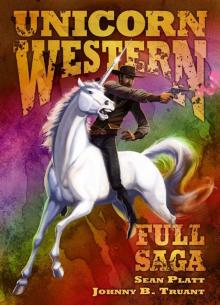 Unicorn Western
Unicorn Western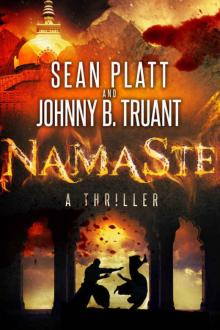 Namaste
Namaste Alien Invasion (Book 2): Contact
Alien Invasion (Book 2): Contact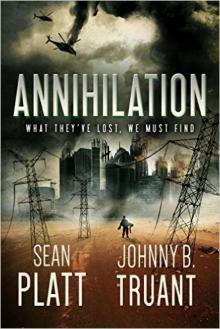 Alien Invasion (Book 4): Annihilation
Alien Invasion (Book 4): Annihilation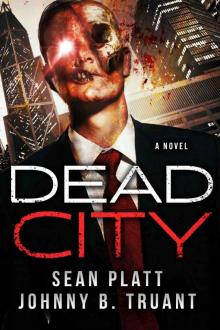 Dead City
Dead City The Eden Experiment
The Eden Experiment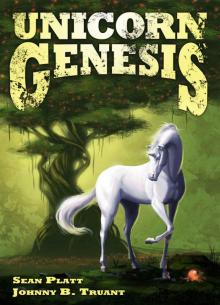 Unicorn Genesis (Unicorn Western)
Unicorn Genesis (Unicorn Western) The Beam: Season Two
The Beam: Season Two Yesterday's Gone: Season Six
Yesterday's Gone: Season Six Homecoming (Karma Police Book 6)
Homecoming (Karma Police Book 6)![[Alien Invasion 01.0] Invasion Read online](http://i1.bookreadfree.com/i1/03/30/alien_invasion_01_0_invasion_preview.jpg) [Alien Invasion 01.0] Invasion
[Alien Invasion 01.0] Invasion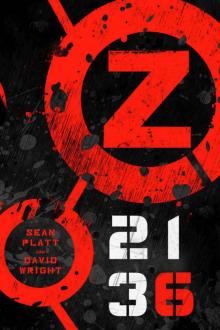 Z 2136 (Z 2134 Series Book 3)
Z 2136 (Z 2134 Series Book 3) Alien Invasion (Book 5): Judgment
Alien Invasion (Book 5): Judgment Threshold
Threshold Judgment
Judgment Jumper: Karma Police Book One
Jumper: Karma Police Book One Boricio Goes Camping (Dark Crossings)
Boricio Goes Camping (Dark Crossings) Extinction
Extinction Yesterday's Gone (Season Four): Episodes 19-24
Yesterday's Gone (Season Four): Episodes 19-24![[No Justice 01.0] No Justice Read online](http://i1.bookreadfree.com/i2/04/09/no_justice_01_0_no_justice_preview.jpg) [No Justice 01.0] No Justice
[No Justice 01.0] No Justice The Beam: Season One
The Beam: Season One La Fleur de Blanc
La Fleur de Blanc The Collectors (Karma Police Book 3)
The Collectors (Karma Police Book 3)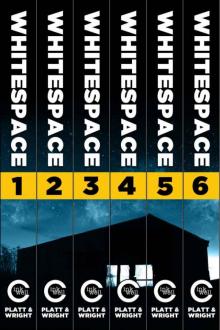 WhiteSpace: Season One (Episodes 1-6 of the sci-fi horror serial)
WhiteSpace: Season One (Episodes 1-6 of the sci-fi horror serial)